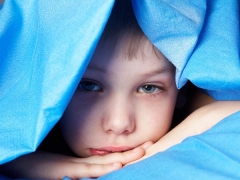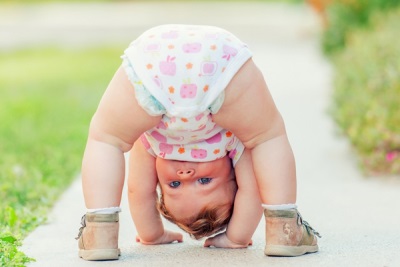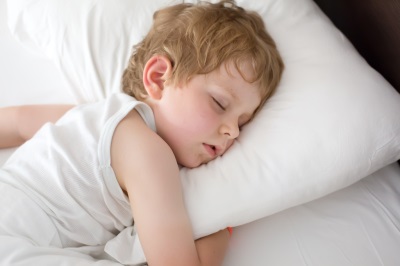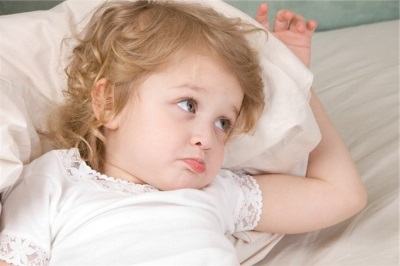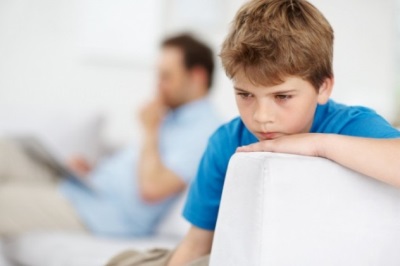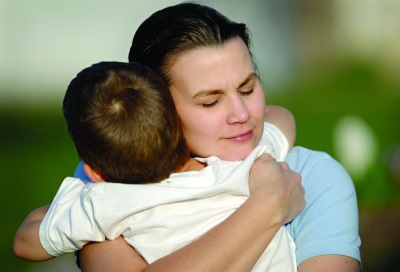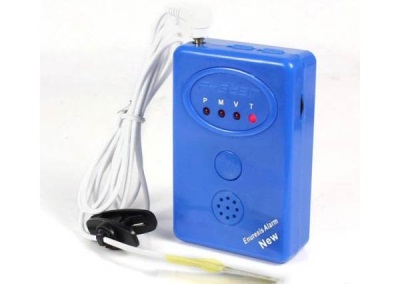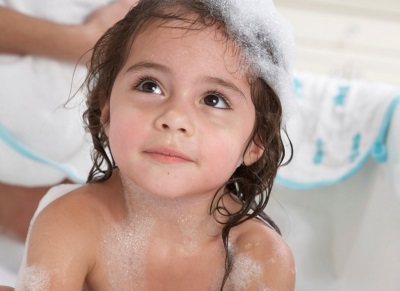Nocturnal enuresis in children
If a child has urination to bed during a night's sleep, they talk about nocturnal enuresis. This problem is very common in childhood. Modern medicine does not include it as a disease, but calls it a developmental stage, during which the child masters the functions of his own body.
Kinds
Depending on the time of formation of the "watchdog" reflex, the following types of incontinence are distinguished:
- Primary. The child has not yet learned to control urination. This is the mildest form, which in 98% of children passes on their own without therapy.
- Secondary. The child had learned to control his bladder in the past and for more than 6 months his bed was dry.
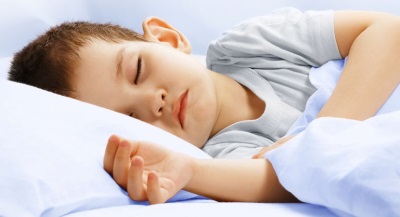
Depending on the symptoms of enuresis is:
- Uncomplicated. The child has no other abnormalities other than enuresis.
- Complicated. The baby has inflammatory diseases, developmental disorders and other pathologies.
Depending on the child’s reaction to the problem, the following types are distinguished:
- Neurotic. This form of incontinence is characteristic of a shy and very shy child with shallow sleep. The baby is very worried about the failures at night, which leads to sleep disturbance.
- Neurosis-like. This form of enuresis occurs in children with hysterical behavior. The child is not very worried when he sees a wet bed before adolescence, when incontinence can cause isolation and neurosis.
At what age is this the norm?
Normally, the child learns to control their urination at night to 6 years of age. At the same time, about 10% of children who turned 6 years old have not mastered such control. Over time, the problem becomes more rare. By the age of 10, incontinence at night is observed in 5% of children, and by the 18th anniversary - only in 1%. In boys, the problem is noted twice as often.
The reasons
Have boys
The problem of incontinence appears more often in boys. To her lead such factors:
- Birth injury, affected spinal cord or brain.
- Long formation of a conditioned reflex. Some boys develop such a reflex later than their peers.
- Stressful situations. Enuresis can occur due to strong fright, constant quarrels of parents, changing schools, moving and similar factors that have strongly influenced the psyche of the child.
- Heredity. If incontinence was noted in both parents, then the problem is possible in 70-80% of cases. If one of the parents suffered from enuresis, the boy will have such a problem in 30-40% of cases.
- Inflammatory diseases of the bladder. They are determined by the results of urine analysis. Congenital pathology of the urinary tract can also lead to incontinence.
- Prolonged use of diapers. The child gets used that after urination the bed is not cold and not wet.
- Violations of the hormonal sphere. With insufficient production of hormones that affect the work of the bladder, the amount of urine released and its concentration, the child becomes incontinent.
- Hyper-Pharmacy. She is often seen in an incomplete family, when the boy is raised by his grandmother or mother.Due to too much care, the child subconsciously behaves like a baby, because he has the feeling that he is small.
- Hyperactivity When a child is highly excitable, the activity of the processes in the brain prevails over the bladder signals. And the brain simply does not "hear" the urge to urinate at night.
- Lack of attention of parents. With such a deficiency, the child subconsciously does everything in order to feel concern from the side of close people.
- Allergies. It is noted that in boys with allergic reactions, as well as with bronchial asthma, episodes of enuresis are quite common problems.
In girls
Due to the peculiarities of the nervous system, girls learn to control the work of the bladder more quickly and start to go to the pot earlier, so the problem of enuresis appears much less often, and if it does, then it is easier to cure her.
Incontinence may appear in the following situations:
- If the development of reflexes is slightly delayed. Some girls learn to manage reflexes later than the same age.
- As a result of stress or psychological trauma. A girl can be affected divorce parents, the appearance of a second child in the family, change of residence, transfer to a new kindergarten and similar factors.
- With a very good sleep. He is a sign of either the innate features of the nervous system of the girl, or overwork.
- If a girl drinks a lot at night. By "wet bed" can lead and otpaivanie during a cold.
- When the influence of hereditary factors. It causes the release of the hormone vasopressin, which reduces the production of urine at night. Lack of this hormone can be transmitted from parents. If one of them had enuresis in childhood, there is a 30 percent chance of incontinence in the daughter. If the problem was with both parents, the risk of enuresis in a girl rises to 75%.
- With injuries of the spinal cord and spine. They disrupt the paths of impulses from the brain, as a result of which they do not reach the bladder.
- If there is a delay in development. With the girl lagging, the formation of all reflexes occurs later.
- If urinary tract infection has developed. Due to the wider and shorter bowel passage in girls, microorganisms that develop on the genitals can get into the bladder.
Teenagers
At this age, enuresis is noted in 5% of children and it is often secondary, but it can also drag on from an early age.
The main reasons for which incontinence is possible in a teenager, consider:
- Stress. The child may be too acutely aware of the tense situation in the school or family, suffer from physical punishment, conflicts with peers, relocation, loss of a loved one and other stressful situations.
- Mental illness. Neuroses and depressions can lead to incontinence, which is further aggravated by experiences and adolescent complexes.
- Congenital abnormalities. They can be both in the nervous system and in the organs of the urinary system.
- Hereditary addiction. As in the younger age, enuresis in adolescents may be due to this problem in his parents.
- Injuries. They can lead to impaired urination reflex.
- Hormonal adjustment. Hormone levels change during puberty, so there may be a failure in the production of hormones that affect urination.
Psychological problems
Night enuresis is almost always a significant problem for the child, and if incontinence develops in a teenager, it can cause a serious inferiority complex.It is difficult for children with enuresis to communicate with their peers, even if other children are not aware of this problem.
The child feels inferior, closes, seeks to avoid contact with other children, seeking solitude. This can leave an imprint on the character - children with incontinence are angry, hesitant, aggressive, insecure, which are transferred to adulthood.
Especially often such changes occur when parents scoff at a child if the child is punished and scolded for wet sheets. That is why parents should be empathetic and caring, and their response to enuresis should be delicate and correct.
Diagnostics
If the child is 6 years old and he still does not fully control the bladder, an additional examination should be carried out. The child is prescribed urine tests (general urine analysis and sample on Zimnitsky) and ultrasound of the excretory system. In many cases, an additional MRI, cystoscopy, EEG, X-ray examination, examination by a neurologist, endocrinologist, psychiatrist, and other specialists are prescribed.
Treatment
There are many ways to eliminate incontinence, but the effectiveness of their impact differs in the situation with each specific child.
Medicaments
- If enuresis is associated with hyperactivity and excitability of the nervous system, the child is prescribed soothing facilities.
- If inflammatory and infectious processes are detected, antibiotics are prescribed.
- If the development of the nervous system is delayed, nootropic drugs may be prescribed to the child.
- For violations of hormone production, affecting the composition and volume of urine, as well as the functioning of the bladder, prescribed desmopressin.
Urinary alarm
This is a very effective method of combating incontinence, which is to use a special alarm clock. It is connected to the sensor, which is placed in the child's panties. When the first drops of urine that hit the sensor, it is triggered by sending a signal to the alarm, causing the child to wake up, turn off the device and go to the toilet.
Other methods
To improve the functioning of the bladder and nervous system, physiotherapy is recommended. The child may be assigned magnetic therapy, electrophoresis, therapeutic douche, acupuncture, electro-electric, a course of therapeutic baths and other methods of physiotherapy. Also recommended therapeutic exercises and massage.
Note the effect and use of psychotherapy. The psychologist will teach the child to relax and use the technique of self-hypnosis. A lot of people are helped by keeping a diary, in which dry nights are designated by suns, and for a certain number of such suns in a row the child is rewarded.
In addition, a child with enuresis is recommended to adjust the daily regimen and follow a certain diet. Restricted drinks in the evening, and at night the child is given food that helps retain water in the body. It is important to ensure adequate intake of vitamins in the children's diet.
Folk recipes
One of the best means to treat enuresis in the people consider honey. He is advised to be eaten before bedtime in order to retain fluid in the body during the nighttime and calm the nervous system.
Also, the child can be given:
- Broth from young branches of cherry and dried stalks of bilberry. Having infused the brewed plants for 15 minutes, add some honey to the drink and give such a decoction to the child twice or three times a day a glass between meals.
- Decoction from the seeds of dill. Seeds dried in a pan (2 tablespoons) are boiled in an enamel container of 0.5 liters of boiling water and left for four hours. Drink this tool should be before eating 14 days, twice a day.
- Infusion of the centaury and the herb of Hypericum. Each plant in a dry crushed form take half a glass and brew 500 ml of boiling water.Having infused for three hours, the broth is given to the child before meals 3-4 times daily for two weeks.
- Tea from corn rylets with honey. A teaspoon of stigmas is poured with boiling water, and after 20-30 minutes a teaspoon of honey is added to the drink. Drink this tea should be twice a day.
- Tea from dried berries and leaves cowberry and dried Hypericum. Plants are taken in a ratio of 1 to 1, for one portion brew two teaspoons of ground raw material with a glass of boiling water. After 15 minutes, the broth should be drunk in small sips (preferably after dinner).
- Balls from crushed egg shell and honey. The components are mixed 1 to 1, make balls with a diameter of 2 centimeters and give the child 4 pieces daily for a month.
In this case, do not forget that the use of any popular recipe should be discussed with a doctor before trying out its effect on the problem.
Tips for parents
- Try to protect the child from various stressful situations.
- Let the child go to bed every day at one time, and 3 hours before this, the volume of liquid should be sharply limited.
- Do not allow active games just before bedtime. At this time, you can read, draw, watch together non-scary cartoons.
- To reduce the pressure on the bladder, you can place a cushion under the baby’s mattress in the baby’s pelvis or under the child’s knees.
- Make sure the child does not have hypothermia. As soon as the baby's legs freeze, the bladder will reflex.
- The child must go to urinate before bedtime. If you wake the child up at night to urinate, do not allow him to nap in the toilet.
- Buy a nightlight for the children's room so that the baby is not afraid to go to the toilet in the dark when he wants it.
- Having noticed a wet sheet in the morning, do not swear and do not be upset before the eyes of a child. After seeing your reaction, the baby will begin to think that he has a very serious problem. Tell the child that this is often the case in children, but with time passes.
- Any method of treatment will have an effect if you instill in the child the confidence that he will succeed.
